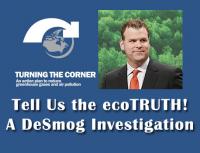This is the first in a DeSmogBlog exclusive investigative series we’re calling, “Operation ecoTRUTH.”
One of the Canadian government’s banner climate change funds could easily go toward subsidies that actually make the problem worse – and officials in Prime Minister Stephen Harper’s administration would neither know, nor care.
Canada’s Auditor General, Sheila Fraser, recently reported to the government’s Public Accounts Committee that she is investigating concerns about the Conservative government’s $1.5-billion Eco-Trust for Clean Air and Climate Change.
The stated purpose of the Eco-Trust is:
“To provide support to those provinces and territories that identify major projects that will result in real reductions in greenhouse gas emissions and air pollutants. The provincial initiatives supported by the Canada ecoTrust for Clean Air and Climate Change will complement industrial regulations and existing federal initiatives. Projects could include provincial technology and infrastructure development, such as carbon sequestration, and clean coal and electricity transmission, that will lead to a significant decrease in greenhouse gas emissions and air pollution. The Government will invest over $1.5 billion in the trust.”
The problem, as identified by the Auditor General, is that the government has no way to confirm that the money goes to projects aimed at “real reductions in greenhouse gas emissions.” The bigger problem, as revealed in committee the other day, is that Environment Minister John Baird doesn’t seem to mind.
Public Accounts Committee Chair, Shawn Murphy (Charlottetown, Lib.) expressed concerns over the Eco-trust fund at a Committee attended by the Auditor General on November 20, 2007.
Murphy said that, despite the Ecotrust’s laudable goals, the provinces had received the money into General Revenue and therefore, “they do not have to spend it on environmental initiatives; in fact, they can spend it on anything they want.”
The Auditor General appeared to agree:
“We are concerned about very large transfers being made purportedly for certain purposes, but when you look at the actual agreements, there are absolutely no conditions requiring the recipient to use the moneys for the purposes being announced.”
Fraser went on to compare the Eco-Trust to a similar failed health equipment program from a few years back:
“Some members might recall a few years ago there was a great deal of press coverage of money for a medical equipment fund and the criticism of some provinces that they were in fact using that money to buy lawnmowers.”
Fraser concluded that:
“We believe there should perhaps be a little more truth in advertising, and we would like to do a piece for Parliament to inform Parliament about what are the major transfers to the provinces, are there in fact any conditions on them, and if there are conditions, does the government have any process in place to actually ensure those conditions are being met?”
Apparently, the current answer is: no.
The feds have thrown $1.5 billion into the air and have listed it proudly among the shamefully new measures they have taken to address climate change. But the provinces can spend the money subsidizing coal plants or tar sands developments that are precisely contrary to the goal of reducing global warming. Maybe it would be better if they spent the money on lawnmowers.
At least it would be updating the provincial fleet.
Subscribe to our newsletter
Stay up to date with DeSmog news and alerts







